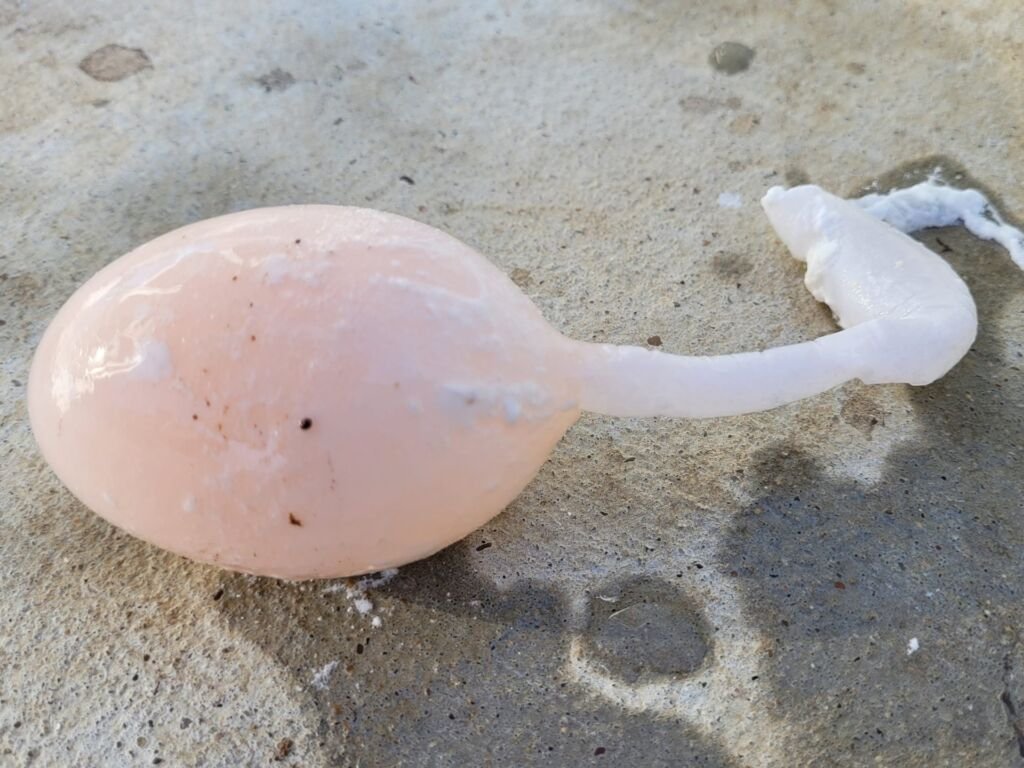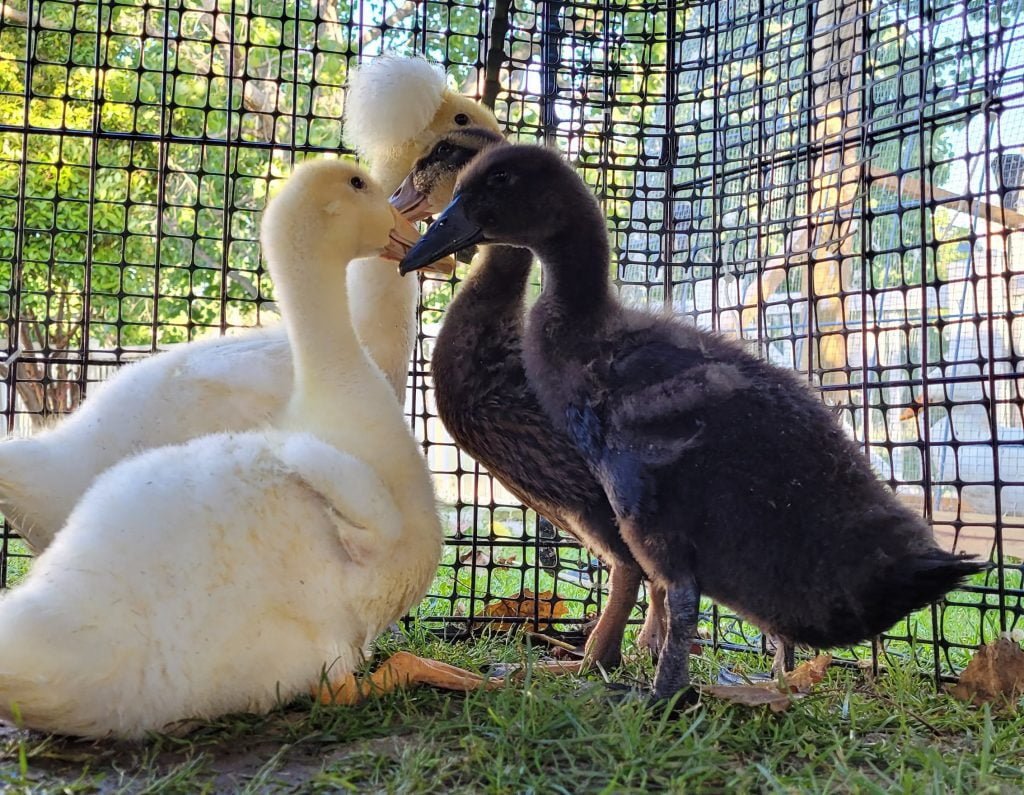Last updated on July 16th, 2024 at 06:30 pm
Ducks are wonderful creatures that can make great pets. They are intelligent, social, and affectionate. However, before you get pet ducks, it is important to research and ensure that you are prepared to provide them with the care they need. Ducks can be wonderful companions, but they are not low-maintenance pets.
We will cover 12 things to know before getting ducks as pets.
1. Ducks are not indoor pets
Ducks are outdoor animals. Ducks need access to fresh air and sunshine and should not be kept indoors full-time. Having them inside for a couple of hours or during the night is okay. Just ensure you allow them to spend at least the same amount of time outside.
They also need a place to swim, so if you don’t have a pond or pool, you must provide them with a wading pool or other water source. Keeping ducks indoors can lead to many health problems, including obesity, boredom, and feather plucking.
2. Ducks are social animals
Ducks are social animals and should not be kept alone. You should get at least two pet ducks, but preferably more. Ducks can be good companions for chickens, but it is important to introduce them slowly and carefully.
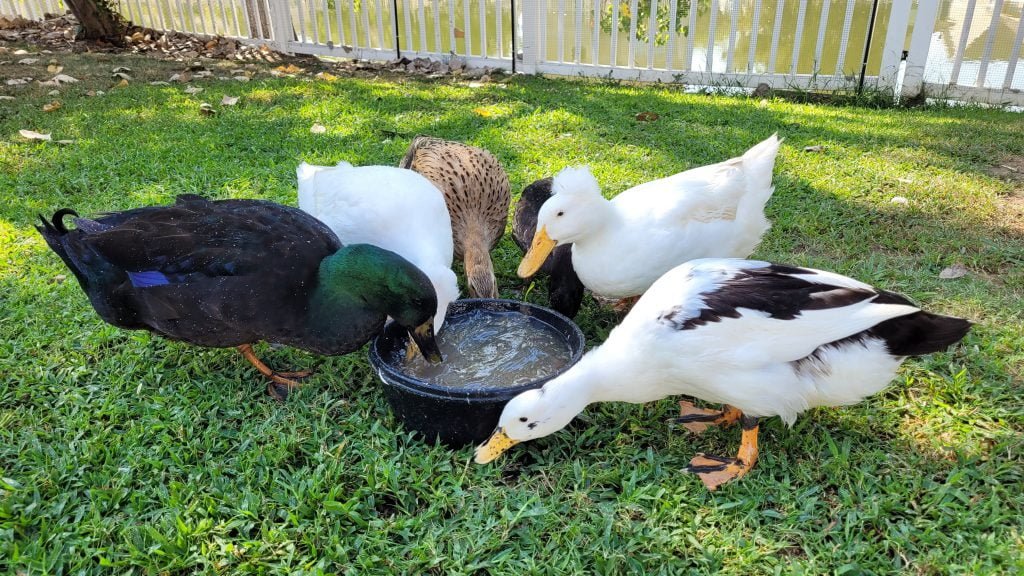
3. Pet Ducks need a secure coop
Your ducks will need a coop to sleep in at night and to protect them from predators. The coop should be well-ventilated and have plenty of room for your ducks to move around. Read more about predator-proof coops in our other blog post:
4. Pet Ducks need a secure run
In addition to a coop, your ducks will also need a run to spend their days. The run should be large enough for your ducks to exercise and forage. It should also have a place for them to swim, such as a pond or a kiddie pool. Some people let their ducks free range, but be aware of the predators in your area. Hawks are the biggest threat during the day for us. This is why we only allow our ducks to forage in the yard when we can supervise them freely. Read more about predator-proof runs here.
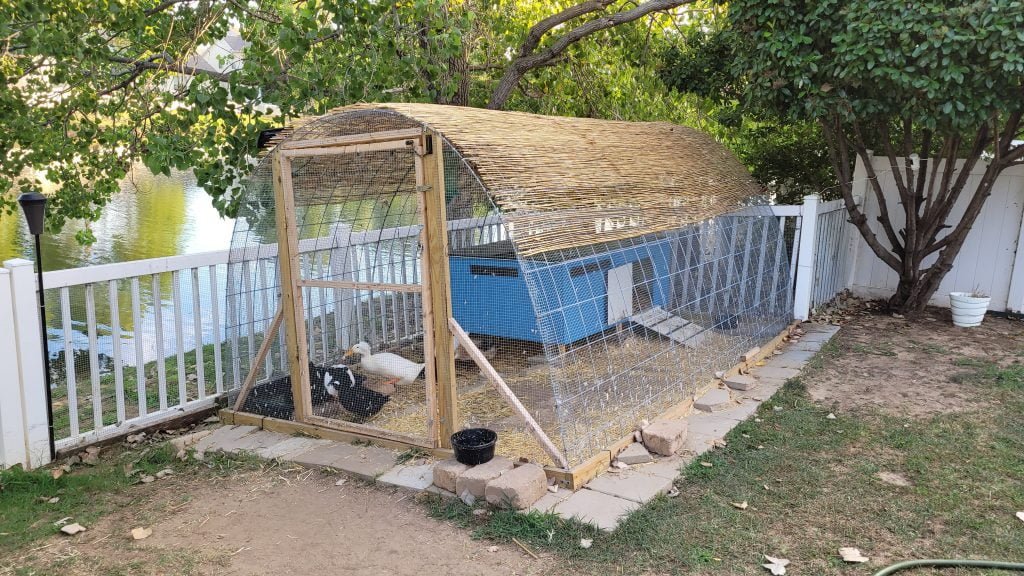
5. Ducks need a balanced diet
Ducks have different nutritional needs than other poultry, such as chickens. You will need to feed your ducks a diet specifically designed for waterfowl. For example, they need much more niacin than other poultry. You can buy duck feed at most farm stores. Read our comprehensive guide on duck food in the following blog post:
6. Ducks need fresh water daily
Ducks are waterbirds (waterfowl) and need water for many aspects of their lives. They use water to drink, bathe, preen, and regulate their body temperature.
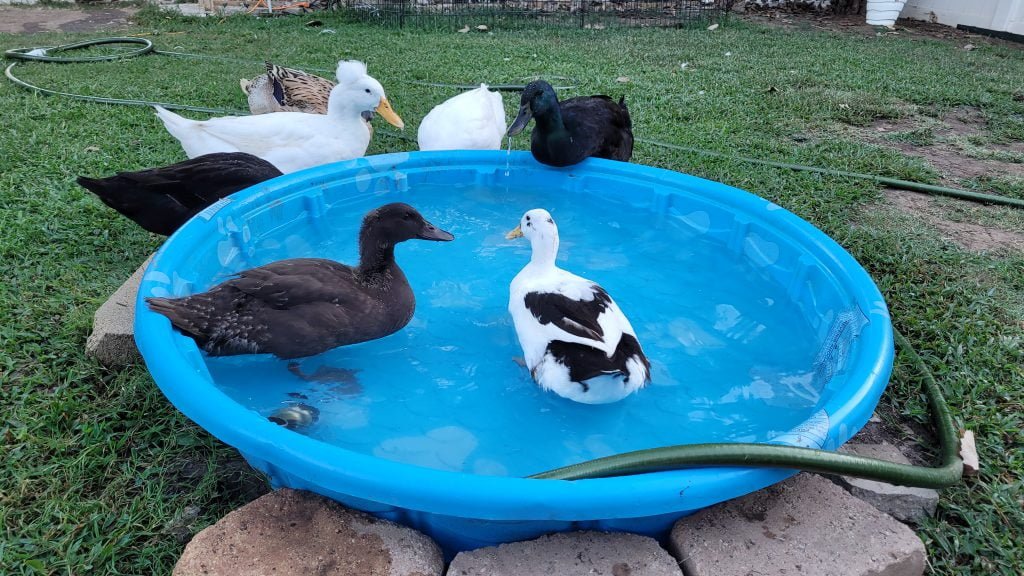
Drinking
Your pet ducks need to drink plenty of water to stay hydrated. Water also helps them digest their food and eat safely without choking. Ducks can drink up to a gallon of water daily, depending on the weather and activity level.
They also need deep water bowls or buckets to dunk their whole bill in. They need to submerge their faces to blow out through their nose holes to dislodge any stuck food or feathers. Chicken waterer won’t work for them. Their waterer should be cleaned daily to prevent the growth of bacteria.
Bathing and Preening
Pet Ducks use water to bathe and preen themselves. This helps keep their feathers clean and waterproof and removes dirt, parasites, and other debris. Preening is also important for ducks to stay healthy and prevent diseases. If they don’t have clean water, they can become ill and exhibit anxious or destructive behavior. Ducks need a water source from the time they hatch.
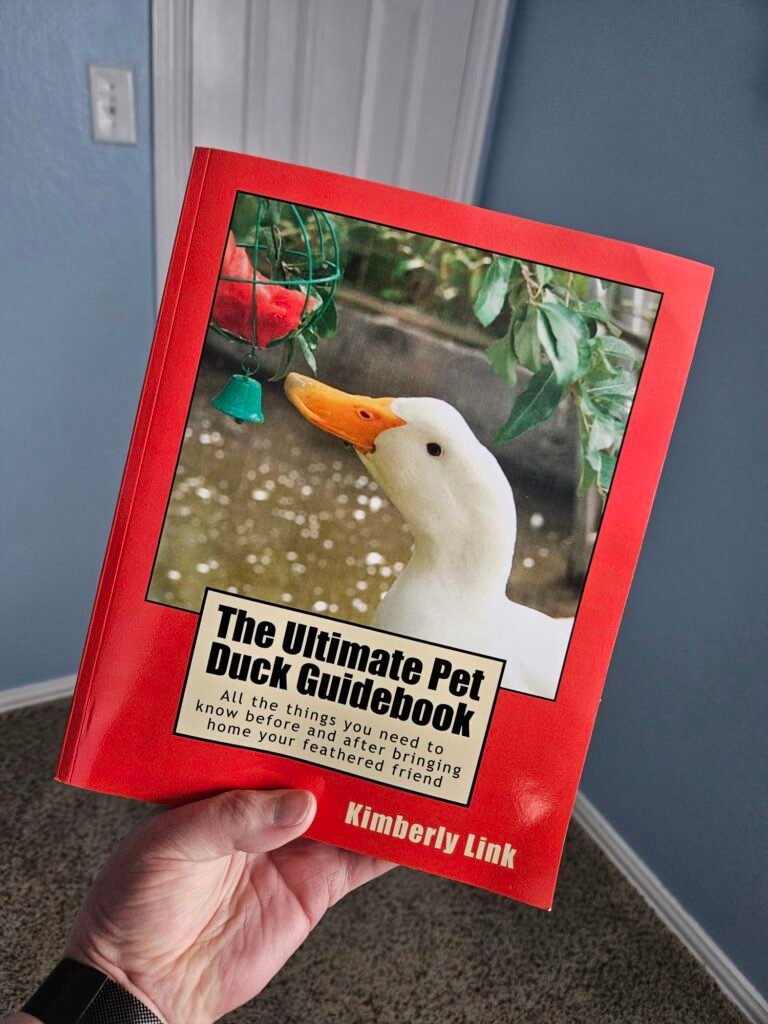
This is the BEST book about pet ducks I have ever had. I can highly recommend it to every duck owner, new or experienced. It is very comprehensive with pictures and illustrations. It covers all topics related to duck care and keeping ducks. It even has multiple case studies.
Swimming and Reproduction
Ducks are excellent swimmers who use their swimming abilities to find food and escape predators. Swimming is also a perfect way for your pet ducks to exercise and stay healthy.
Ducks use water to regulate their body temperature. They will often splash water on themselves or bathe in cold water to cool down on hot days.
Ducks need water to reproduce. Male ducks use water to display to females and to attract them to mate. The process of mating is also easier for them in water.
Ducks can be kept without a large body of water, but they need to have something to splash around in, like a kiddie pool, an old bathtub, or a large water bowl.
7. Pet Ducks Can Be Messy
Ducks poop a lot, and they can also make a mess when they eat and drink. You will need to clean their coop and run it regularly. If you are not prepared to clean up after them, ducks may not be the right pet for you.

When you are keeping ducks inside for longer, you may want to consider a duck diaper.
8. Ducks need regular care
Your pet ducks must be fed and watered daily, and their coop must be cleaned regularly. We change their water about three times daily.
You will also need to check their feathers and feet for any problems. Bumblefoot, an infection of their feet, is common for ducks. But it would help if you also looked for behavioral changes. Female ducks can have reproductive problems, such as soft-shelled eggs or becoming egg-bound. It is imperative to recognize that as early as possible to save their lives.
9. Ducks can live for a long time
Ducks have an average lifespan of five to ten years, but their life expectancy can vary depending on their breed, environment, and living pattern. In captivity, ducks can live up to 20 years. Larger breeds of duck, like jumbo pekins, have the shortest lifespans as they were bred solely for meat production.
Ducks are pretty hardy animals. They are much less likely to die of diseases than chickens, and they can also better survive the heat of summer and the cold of winter.
Be prepared to make a long-term commitment to your ducks before you get them.
10. Ducks can be noisy
Ducks quack, and they can be pretty loud, especially when they are excited or upset. If you live in a residential area, you may want to check with your neighbors to see if they mind before you get ducks. You could also consider getting drakes. They are quieter.
11. Ducks can be destructive
Ducks like to forage and play in every little bit of water they can find. They will happily play in muddy puddles. But they will dig holes while doing that so that they can damage your yard and garden. If you have valuable plants or landscaping, you may want to take steps to protect them from your ducks.
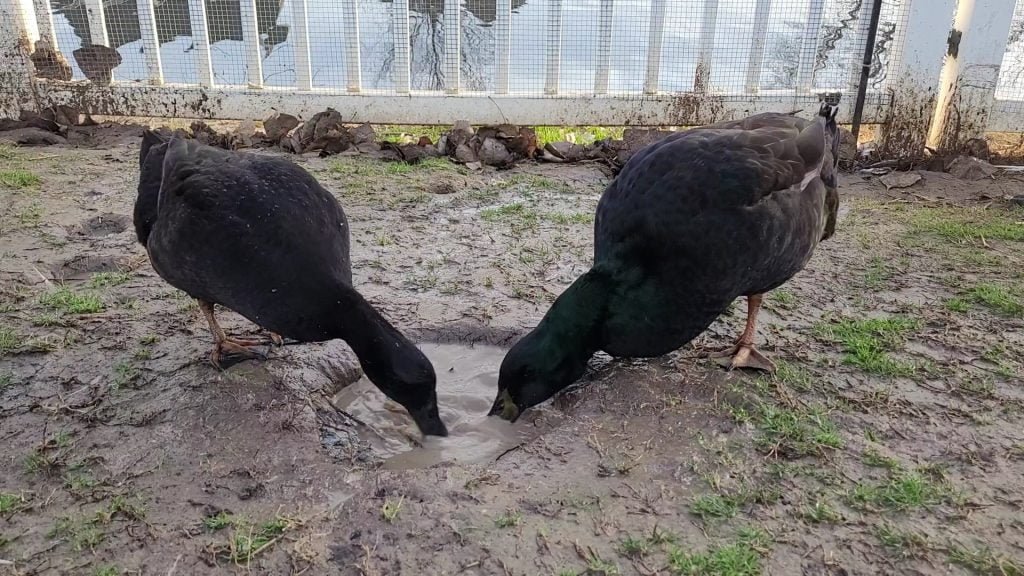
12. Ducks can be expensive
Housing
We have already covered the importance of predator-safe coops and runs for ducks. A well-built duck coop can be expensive, especially if you have to hire a professional to build it for you or get a pre-built one. You can save some money if you are handy and can build one yourself as we did.
Food
We also learned that pet ducks need a specialized diet that includes grains, insects, and vegetables. Duck food can be more expensive than other types of pet food, and you may need to purchase it online or from a specialty store.
Veterinary care
Ducks can be susceptible to a number of diseases and health problems. If your pet duck gets sick, you must take it to a veterinarian specializing in avian care. Avian vets can be more expensive, and duck vet bills can add up quickly. Finding an avian vet in your area is difficult, and you may need to drive quite a bit.
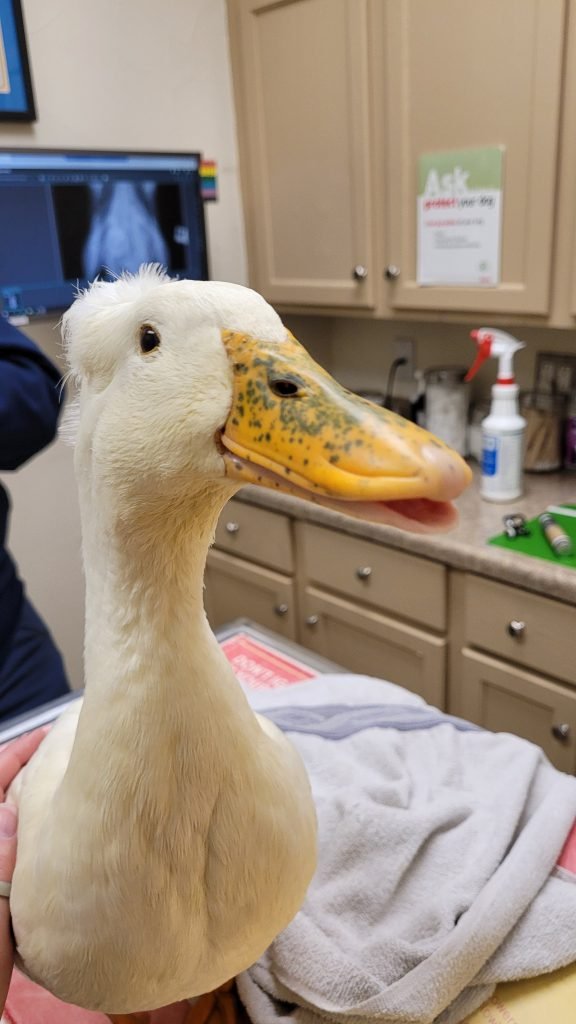
Licensing and permits
You may need a license or permit to keep ducks as pets in some areas. The cost of these licenses and permits can vary depending on where you live. Beyond that, not all cities or HOAs allow ducks, not even with a permit. Please be aware of the ordinances in your city before getting ducks.
Conclusion
Overall, ducks can be great pets for people who are willing to provide them with the care they need. They are intelligent, social, and very affectionate. However, it is important to know the challenges of owning ducks before you decide to get them.


